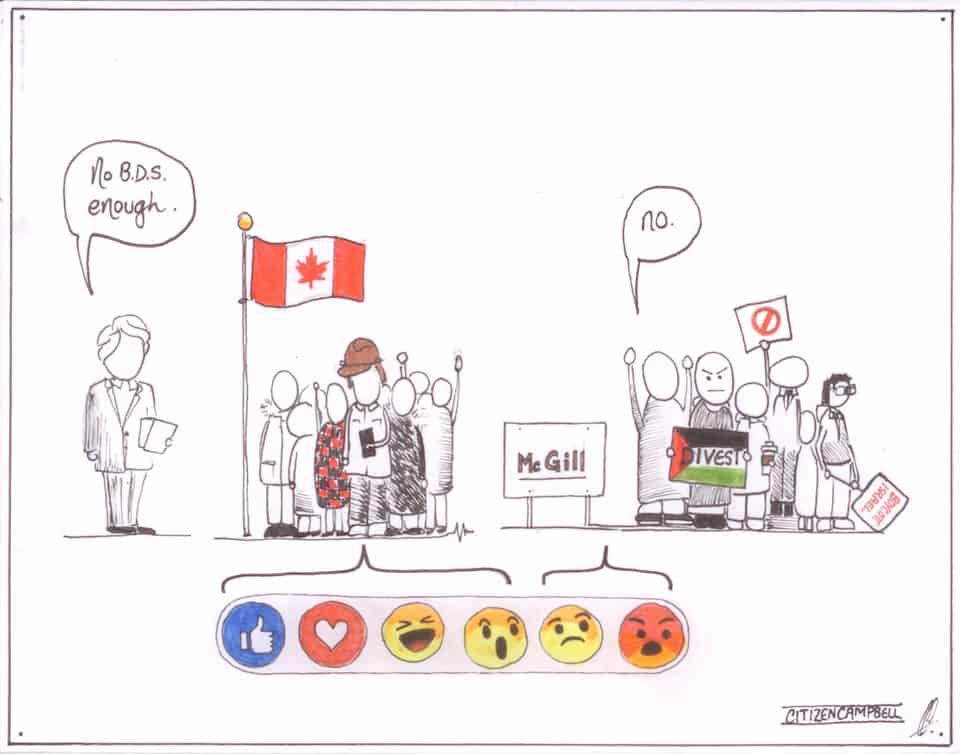[dropcap]A[/dropcap]S George Orwell famously wrote, “doublethink means the power of holding two contradictory beliefs in one’s mind simultaneously, and accepting both of them.”
One can only speculate as to what Orwell would have had to say if he had lived to see opposition to the crimes of a powerful military occupying force, decried as hate speech by elected officials in the chambers of a proud democracy. It is safe to suppose that his reaction might be a mix of disgust and vindication: disgust at the obliqueness with which defenders of an oppressed people are slandered and stigmatized by their elected officials, and vindication at how thoroughly his signature ‘doublethink’ concept underpins one of the most effective propaganda systems in the modern world.
When Conservative MP David Sweet took the floor last month, calling on government front-benchers to denounce the “anti-semitic” Boycott, Divestment, and Sanctions (BDS) movement, members of the governing Liberal party, led by Stephane Dion, expressed “reservations” about the motion’s goals and language. Ultimately, however, they voted in its favour.
Prime Minister Justin Trudeau even took to social media to announce that “the BDS movement, like Israeli Apartheid Week, has no place on Canadian campuses.” When the dust settled, the motion to condemn the BDS movement passed with a resounding 229-51 vote. Even those who opposed it, like NDP leader Thomas Mulcair, have not dared to express support for BDS, criticizing the motion only on the grounds that it threatens freedom of expression in Canada.
What is so objectionable about BDS that both the government and official opposition are almost competitively united in their repudiation of the movement? As the newly adopted motion explains, the BDS movement “promotes the demonization and delegitimization of the State of Israel.”
This is where the importance of doublethink starts to become apparent. Implicit in the charge that BDS delegitimizes Israel is the premise that the act of delegitimizing states itself should be condemned. Supporters of the bill, one might naturally assume, will then surely condemn Israel for its delegitimization of Palestine through its illegal occupation of Gaza and the West Bank, its blockade of Gaza and pillaging of Gazan natural gas, its ongoing construction of illegal settlements in the West Bank, and its regular military incursions into Gaza. If mere criticism and calls for political action count as delegitimization, military oppression and illegal land seizures more than qualify, and ought to be similarly condemned.
Unsurprisingly, in the BDS debate, this is not the case. Delegitimization is both condemned and accepted, depending on whether it is Israel or Palestine that is being targeted.
In line with this, a common refrain from the pro-occupation side — usually employed to explain why Israel has a right to defend itself from Palestinian rockets — is that Israel, unlike Palestine, is a state in the international system, which can avail itself of international laws like Section 51 of the UN Charter, which gives states the right to self-defence.
The rather cynical and legalistic insistence that Palestine is not a state, and thus cannot avail itself of international law, is a triumph of doublethink. Palestine has striven for statehood at the UN for some time now, and would have already won it, were it nor for fierce resistance from Israel and its powerful ally, the US, which threatened to slash UN funding if Palestine was so much as given observer status.
Indeed, during the last big push for Palestinian statehood, there was deafening outcry from the Israeli right, denouncing the action as ‘unilateral’ and insisting that the path to statehood was not through the UN, but rather through negotiations with Israel.
By ‘unilateral’, they meant that the General Assembly supported Palestinian statehood 138 to 9, but that Israel did not. Thus, the path to statehood for Palestine was not ‘unilateral’ action at the UN, but rather negotiations with its military occupier. In the meantime, Israel could continue to ‘defend itself’ against its victims under Section 51, while denying Palestine’s right to defend itself from Israeli occupation.
Arguments like these, accepted and repeated by elected politicians in liberal democracies, may well be the very pinnacle of doublethink. Orwell might well find humour in the fact that the lessons of his iconic 1984 are both well known, and blithely disregarded by citizens of self-declared ‘enlightened’ states like Canada. This humour would undoubtedly be tempered, however, by knowledge of the abominable suffering and injustices that continue only because the powerful, simultaneously, continue to hold contradictory beliefs.
Simon Capobianco is a third-year student at Woodsworth College studying math and philosophy.


